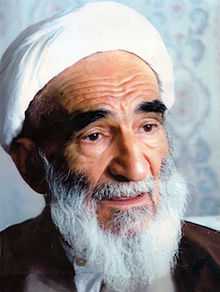Nematollah Salehi Najafabadi

Ayatollah Nematollah Salehi Najafabadi (born 1923/24 in Najafabad, Isfahan province - death 2006 in Tehran) was an Iranian cleric and proponent of Islamic Unity, who spent most years after the Iranian revolution of 1979 under house arrest.
The Special Court for the Clergy had ordered that he do not teach and receive students. His writings were censored.
Background
Nematollah Salehi Najafabadi was born in 1923/24 and studied in Isfahan with Ayatollah Rahim Arbab and Ayatollah Haj Shaikh Mohammad Hasan Alem Najafabadi. Later he continued his studies in Qom with Ayatollah Alameh Tabatabai and Ayatollah Boroujerdi.
His most outstanding work is Shahid-e Javid (The Eternal Martyr), which he started to conceive in 1961. It radically reinterpreted early Shii history. Despite the author's house arrest, it is in its fifth printing in Iran. Many books have been published in response to it, including by such distinguished ulama as Ayatollah Motahari (d. 1979) and Ayatollah Mohammad-Reza Golpaygani (d. 1993).[1]
In his essay Vahdat-e Islami, Najafabadi advocates steps towards Shii and Sunni ecumenism. He believes Shii ulama should be permitted to follow Sunni fiqh in certain areas and vice versa. The article was banned by the Special Court for the Clergy.
He died in Tehran in 2006.
Works
(in Persian)
- Shahid-e Javid (The Eternal Martyr) (Qom 1968)
- Tautee-ye Shah bar zedde Imam Khomeini (The Shah's Conspiracy against Khomeini) (1984)
- Vahdat-e Islami (Islamic Unity) (article, 1985)
See also
- Ayatollah Montazeri
- Vilayat-e Faqih
References
Further reading
- The Failed Pan-Islamic Program of the Islamic Republic By Wilfried Buchta
- Hejab in the Islamic Republic By Fatemeh Sadeghi
- The Politics of Shahid-e Javid